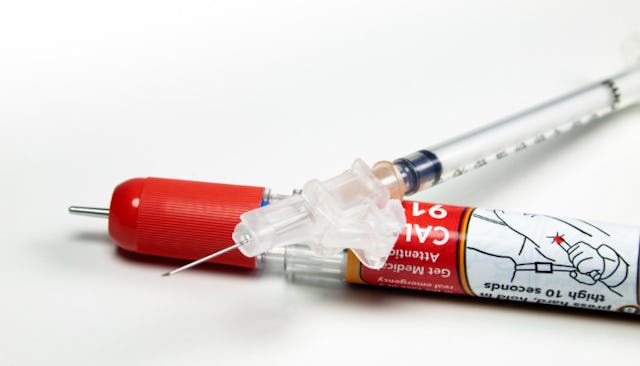Grieving Mom Pushes To Make EpiPens Widely Available And Accessible

A grieving mother is pushing for legislation that would put EpiPens in public places and in the hands of first responders.
Children and adults with serious allergies often carry emergency EpiPens with them in case of coming into contact with an allergen that could seriously hurt them, but one grieving mother is working to put more EpiPens in public places and in the hands of first responders, and her efforts could save lives.
According to the Chicago Tribune, 13-year-old Annie LeGere was at a sleepover at a friend’s house in August when she started having trouble breathing. Annie had seasonal allergies, and her mother–a emergency room nurse–brought some Benadryl with her on her way to pick Annie up. Annie’s allergic reaction was much more severe than Shelly LeGere expected, though, and when she arrived Annie was unreponsive and barely breathing. A police officer was on the scene, but did not have an EpiPen and could not help.
Annie LeGere died several days later of brain damage from the lack of oxygen caused by anaphylaxis, which happens when a body’s immune system overreacts to an allergen. Anaphylaxis can cause hives, shortness of breath, swelling, and other symptoms, and it can eve be fatal. Anaphylaxis is treated with the injection of epinephrine to reverse airway swelling, which is why LeGere is pushing to have it more readily available in public places and in the hands of first responders, like police, firefighters, and emergency personnel.
“If (epinephrine) had been available, maybe Annie would be with us today,” she said.
Doctors still don’t know what Annie LeGere had an allergic reaction to, but say it was probably something she ate. Her mother says that before her death, Annie only had mild seasonal allergies, and on the night of her death she ate chocolate, pretzels, and popcorn, but she had eaten those things many times before.
According to the Asthma and Allergy Foundation of America, however, a person cannot predict how severely they will respond to an allergen from one time to the next, and something like a nut allergy that previously caused only mild symptoms could prove fatal.
This is the sort of thing that keeps parents up at night, because it’s so unpredictable. And that unpredictability is why Shelly LeGere is campaigning to have EpiPens available in public places, and for all first responders to carry them, because anaphylaxis can appear suddenly, even in people who never previously thought they had allergies severe enough to need it.
LeGere and other allergy awareness advocates point out that food allergy rates among children have been rising dramatically in the past decades. The Centers for Disease Control and Prevention says there’s been a growth of 50 percent between 1997 and 2011, and teenagers are most likely to have fatal reactions to allergens in food.
LeGere is pushing for legislation in Illinois that would allow first-responders like police, firefighters, and other emergency personnel to carry and administer EpiPens in the case of emergencies like the one that took Annie LeGere’s life. A lot of people might not know that first responders might not be carrying epinephrine, and that sounds like a very important and logical step that could save the lives of a lot of kids and adults who would never expect that something like this could happen to them.
This article was originally published on